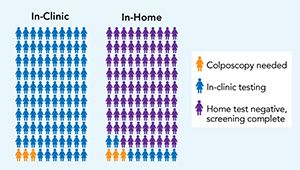Top ten splashes from KPWHRI in 2019

Explore 10 ways that Kaiser Permanente Washington research has advanced health and health care this year
The past year has been a defining one in the history of Kaiser Permanente Washington Health Research Institute (KPWHRI), with two new leaders chosen:
- Rita Mangione-Smith, MD, MPH, became our new executive director—and Kaiser Permanente Washington’s vice president for research and health care innovation. Stepping down after 17 years as our executive director, Eric B. Larson, MD, MPH, will continue as a senior investigator.
- And Katie Coleman, MSPH, became the new director of the MacColl Center for Health Care Innovation. Ms. Coleman also directs Kaiser Permanente Washington’s Learning Health System Program.
We’ve also published more than 320 peer-reviewed articles so far this year and won tens of millions of dollars in new grant revenue, which we’ll tally for our annual report to be released in January.
Among all we’ve accomplished, the following are just 10 big splashes—in terms of scientific or clinical impact, dissemination through traditional or social media, or combinations thereof:
Home HPV testing
When women who were overdue for cervical cancer screening received a mailed test for the HPV virus, their screening rates rose by 50 percent. This University of Washington (UW)–Kaiser Permanente collaboration, led by Rachel Winer, PhD, and Diana Buist, PhD, brings women closer to having an alternative to in-clinic Pap tests: home self-sampling for the strains of HPV that can cause cervical cancer. The clinical team that supported this trial won the 2019 Birnbaum Award.
Six Building Blocks
Michael Parchman, MD, MPH, led a research team including UW colleagues to develop and use new ways to support small clinics in reducing opioid use in the rural Pacific Northwest. Their innovative program, Six Building Blocks, gives small clinics team-based practice support to reduce patients’ use of opioids.
Breast MRI for cancer survivors
Karen Wernli, PhD, led a large Breast Cancer Surveillance Consortium study of breast magnetic resonance imaging and found using it may lead to unneeded biopsies. When screened using breast MRI, breast cancer survivors had more than twice as many biopsies as did those screened using mammography alone. Because of these extra biopsies, breast MRI detected more second cancers—but probably no additional ones that routine annual mammography would not have found.
Medical imaging rates up
Medical imaging rates keep rising, despite campaign to reduce them, according to a study by Diana Miglioretti, PhD, with colleagues at the UCSF and Kaiser Permanente Northern California. And that unfortunate trend is being seen even in pregnancy: CT scan use in pregnancy rose in in the United States and Canada over two decades, the same research group reported.
Gun violence and public health
To address the chronic problem of violence, including homicides and suicides, Kaiser Permanente launched the Task Force for Firearm Injury Prevention, which David Grossman, MD, MPH, cochairs. He is working on helping to stop violence, including preventing injury from firearms. Meanwhile, Julie Richards, PhD, is studying how to prevent suicide by firearms, as one of the first three projects funded by Kaiser Permanente’s Firearm Injury Prevention Task Force.
Weight-loss medication
The anti-obesity medication used most often in the United States, phentermine, is approved for short-term use: 12 weeks or less. But obesity is a long-term challenge, and David Arterburn, MD, MPH, and colleagues found that this medication is safe and effective for longer-term use for weight loss.
Some minorities get diabetes at lower weights
Members of some racial and ethnic minority groups are much more likely to have diabetes or prediabetes at lower weights—even at normal or below-normal body mass index (BMI), according to research involving Dr. Arterburn. For instance, at normal weight, Pacific Islanders are three times more likely than whites to have diabetes.
Getting flu vaccine to those at most risk
Through Kaiser Permanente Washington’s Learning Health System Program, Michael L. Jackson, PhD, provided predictive analytics, data programming, and implementation support to clinicians in the care-delivery system. This learning partnership made it possible to quickly design and launch a targeted approach to reach out to members at high risk of flu-related complications and encourage them to get their free annual flu shot. The goal: lowering illness, hospitalization, and even death in vulnerable groups such as people with chronic conditions.
Some medications can cause falls in older adults
The Adult Changes in Thought (ACT) study found that some prescribed medications may cause falls: A variety of central nervous system-active drugs were linked to an increased risk of falling among older people with dementia. These medications included antidepressants, anticholinergics, antipsychotics, benzodiazepines, sedatives/hypnotics, and opioids. A “prescription” to reduce falls? Cautious use and close monitoring of these drugs.
Kaiser Permanente’s Research Bank
Outreach to diverse populations has been key this year, as the Washington region joins Kaiser Permanente’s national Research Bank, which was launched in 2016. James Ralston, MD, MPH, is involved in this effort, which will help in discovering how best to prevent, treat, and cure genetically related illnesses. Volunteers share their blood samples and health information and become part of a broad-based, communal effort that can drive health improvement among Kaiser Permanente members and the public at large.
Happy holidays, and onward and upward to 2020!
By Rebecca Hughes
Other researchers
,
Karen Wernli, PhD
Senior Investigator
,
cancer screening

Mailing home HPV test may offer alternative to Pap screen
Dr. Diana Buist and team reflect on HOME trial showing 50 percent screening boost in underscreened women.
10 ways we made a healthier world in 2018

Kaiser Permanente Washington research tackled problems like obesity, suicide—and care that doesn’t promote health.



